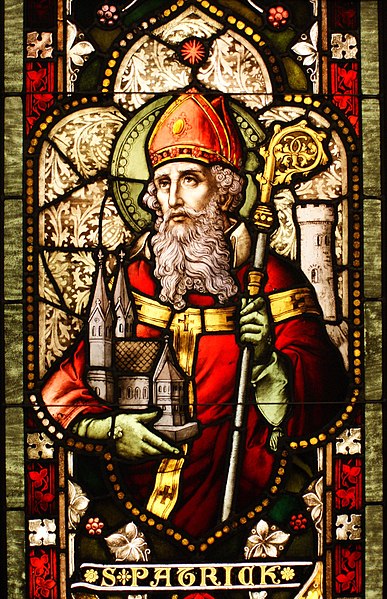Yesterday we celebrated St Patrick's Day. Between ceremonies and meetings with friends for the feast day I did not get a chance to blog.
St Patrick is a most interesting Saint, one, though, who has been reinvented to fit in with the celebration of Irish nationalism. As I was growing up I came to like St Patrick's Day less and less, and now that the forces of secularisation have created "Paddy's Day" and cut it from the religious, I have even less time for the "traditional" celebrations.
Am I a killjoy? Well I'm sure many will think I am. But I do favour a proper celebration of the feast and an authentic honouring of the man whose feast it is - the spiritual father and apostle of the Irish. St Patrick was an extraordinary individual: a man of deep faith - a man whose heart was firmly fixed on Christ and in communion with Rome, a man of the Scriptures and a man immersed in the theology of Christ and the Holy Trinity, as his works reveal - that is only to be expected given that he studied at the great school of Lerins.
I believe we need to reclaim St Patrick - take him back from the bawdy drunken secularists who are using him as an excuse for a knees up - and worse as news out today tells us there has been a rush for the morning after pill in the last few days, God help us! As we launch out in the process of renewal, St Patrick must have an important role, and Pope Benedict has alluded to this in his prayer for the Church in Ireland.
The study of St Patrick's life and teaching will reintroduce the Church in Ireland to Scripture and orthodox theology, particularly to the concept of ecclesial communion; to prayer and the importance of a personal relationship with God; to the beauty of creation, though with the caveat that we do not worship nature as our more "ecologically" minded people seem to. Reflecting on Patrick's mission we can rediscover evangelical zeal and courage - no fearful hiding from issues with Patrick - excommunicating Coroticus and his soldiers was a daring act, yet it needed to be done.
St Patrick was not afraid of negative public opinion - some of the established Christians in Ireland did not like him. It seems he was too strident for them - he probably disturbed their comfortable, lukewarm Christianity, and so he challenged them. There was no licking up to them, putting them on committees to keep them on side or doing everything he could to keep them in. He preached the Gospel, and like St Paul he put it to them: "Take it, or leave it". Yet he was also the soul of charity and tenderness: the virtues of prudent and charity helped him harmonise the zeal and gentleness. It is the genius of the Saints which reveals how one can be tough and gentle at the same time: in recent years we have seen this in Blessed Teresa of Calcutta and Ven. John Paul II.
And Patrick is a true father. In his Letter to Coroticus he is defending his Irish children, because, as St Paul said in his letters, Patrick has fathered us in faith, and so as we struggle with the various issues which seem to be creating problems for the Church here, we must turn to him. Blessed John XXIII used to say the Lord every night before going to sleep: "Lord, I've done my best, it's your Church, look after it now" (or words to that effect). So too with Patrick: we Irish should say to him: "Dear Father, Patrick, Ireland is your responsibility, look after it and help us do what we can to bring renewal". It would be no harm if our Beloved Patron took his crosier and beat some sense into the Irish Church - it would do us all a little good. Is that too negative? Perhaps, though I think not.
So now, how do we reclaim the feast of St Patrick? As Christians we have Christianised pagan feasts before, though ironically this pagan feast was once a religious feast. One possibility could be to add a second feast day in honour of St Patrick - his relics were not translated so that's a non-runner unless we kindly ask the Church of Ireland to allow us exhume his remains from the grave in Downpatrick (if any are left - if he's there at all) and translate them to a worthy shrine and then mark the day as a feast. We could celebrate the day he arrived in Ireland or the day he established the Primatial See in Armagh - that could be celebrated as a day of evangelisation - and devoid of secular interest could be a feast to celebrate faith. But those dates are now probably known only to God.
All that said, why should we give up his dies natalis? So maybe it is time for some counter cultural revolutionary action. Seeing as the orthodox Christians are now the dissidents in Ireland, we should do some dissenting from the national booze up. A parade of our own with the Blessed Sacrament and a statue of St Patrick, Holy Mass and prayers and lots of hymns: good old fashioned hymns that rouse the soul - none of the anemic stuff that has bored us to tears for the last twenty years. No guitars or fiddles just a good organ and strong human voices booming out "Faith of our Fathers" making the secularists nervous and wondering is Patrick himself coming on the clouds with a good hefty crosier to rid Ireland once again of the metaphorical serpents of paganism and disbelief. Ah, one can but dream!
Rant over. I had better say my prayers. First Vespers of St Joseph - another wonderful feast.



